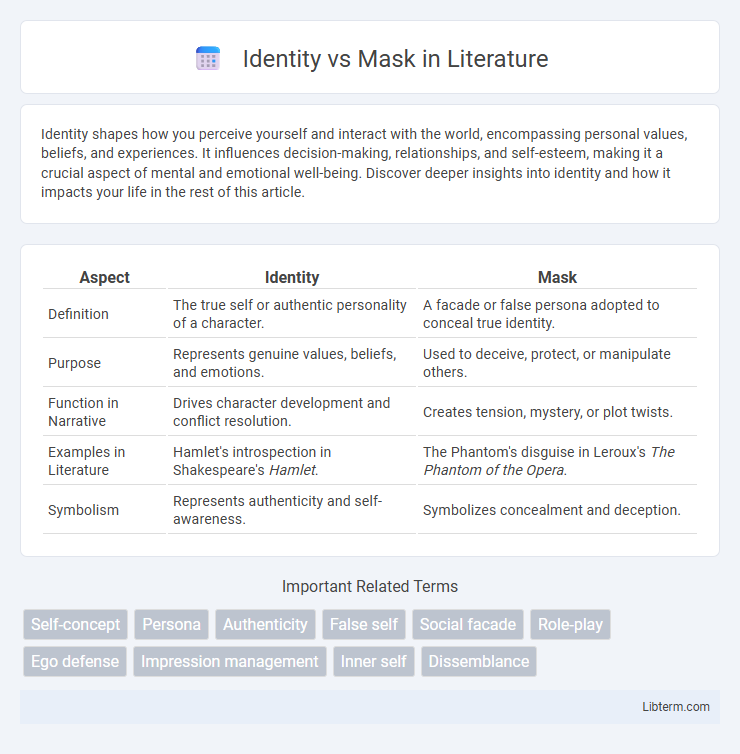Identity shapes how you perceive yourself and interact with the world, encompassing personal values, beliefs, and experiences. It influences decision-making, relationships, and self-esteem, making it a crucial aspect of mental and emotional well-being. Discover deeper insights into identity and how it impacts your life in the rest of this article.
Table of Comparison
| Aspect | Identity | Mask |
|---|---|---|
| Definition | The true self or authentic personality of a character. | A facade or false persona adopted to conceal true identity. |
| Purpose | Represents genuine values, beliefs, and emotions. | Used to deceive, protect, or manipulate others. |
| Function in Narrative | Drives character development and conflict resolution. | Creates tension, mystery, or plot twists. |
| Examples in Literature | Hamlet's introspection in Shakespeare's Hamlet. | The Phantom's disguise in Leroux's The Phantom of the Opera. |
| Symbolism | Represents authenticity and self-awareness. | Symbolizes concealment and deception. |
Understanding Identity: Core Definitions
Identity refers to the unique combination of characteristics, values, beliefs, and experiences that define an individual or group. It encompasses personal attributes such as name, ethnicity, gender, and psychological traits, establishing a cohesive sense of self. Understanding identity involves recognizing both the inherent aspects and the evolving nature of how individuals perceive themselves and are perceived by others.
The Psychology Behind Wearing Masks
The psychology behind wearing masks reveals how individuals use masks as symbolic tools to manage social identity and protect self-esteem during interpersonal interactions. Masks serve as psychological shields that help navigate vulnerability by concealing true emotions or insecurities, facilitating conformity to societal expectations. This behavior aligns with Erik Erikson's theory of identity vs. role confusion, where masks function as adaptive mechanisms in the continuous negotiation between authentic self-expression and social acceptance.
Historical Contexts of Identity and Masks
Throughout history, masks have symbolized complex facets of identity, serving as tools for ritualistic ceremonies, social roles, and cultural expression in civilizations such as Ancient Egypt, Indigenous tribes, and Japanese Noh theater. The use of masks often reflects societal norms and hierarchical structures, enabling individuals to adopt alternate personas or conceal their true selves in public settings. This dynamic interplay between identity and mask reveals the psychological and social functions of disguise across different historical contexts, highlighting the fluidity and performative nature of human identity.
Social Media: Amplifying Our Masks
Social media platforms amplify the concept of Identity vs Mask by enabling users to curate idealized versions of themselves, often masking authentic emotions and flaws. These digital personas influence self-perception and social interactions, creating a complex interplay between genuine identity and fabricated online masks. The pervasive exposure to curated content can intensify pressures to conform, impacting mental health and authentic self-expression.
Authenticity vs. Social Expectations
Identity versus mask highlights the tension between embracing personal authenticity and conforming to social expectations. Authenticity requires honest self-expression aligned with inner values, while social expectations often demand adopting a mask to fit societal norms. Navigating this balance influences psychological well-being and the development of a coherent, true self.
Culture’s Role in Shaping Identity and Masks
Culture profoundly influences identity formation by providing shared values, beliefs, and traditions that guide individual self-perception and social roles. Masks, both literal and metaphorical, serve as cultural symbols that individuals use to navigate societal expectations and express complex identities. The interplay between cultural norms and personal identity shapes how people present themselves and negotiate authenticity within their communities.
The Impact of Masks on Mental Health
The use of masks, whether literal or metaphorical, significantly affects mental health by fostering feelings of isolation, anxiety, and identity confusion. Prolonged mask-wearing can lead to emotional distancing, impairing social interactions and exacerbating stress or depression. Understanding the psychological impact of masks is crucial for developing strategies that support mental well-being while maintaining necessary protective measures.
Breaking Free: Steps Toward Authentic Living
Breaking free from the Identity vs Mask conflict involves recognizing and dismantling the false personas shaped by external expectations. Embracing authentic living requires self-reflection, vulnerability, and consistent alignment between inner values and outward actions. Cultivating genuine connections and practicing self-compassion strengthens the path toward true self-expression and psychological well-being.
Navigating Personal and Professional Identities
Navigating personal and professional identities requires balancing authenticity with social expectations to maintain credibility and self-coherence. Individuals often adapt their behavior and presentation to fit workplace norms while striving to preserve core values and beliefs. Understanding this dynamic promotes healthier relationships, effective communication, and professional growth without sacrificing individuality.
Embracing Vulnerability: Living Beyond the Mask
Embracing vulnerability allows individuals to live authentically by shedding the identity mask that conceals their true emotions and desires. Psychological studies confirm that vulnerability fosters deeper connections and personal growth, enabling a meaningful life beyond superficial facades. Cultivating this openness reduces anxiety and promotes mental well-being, empowering people to confront insecurities without fear of judgment.
Identity Infographic

 libterm.com
libterm.com